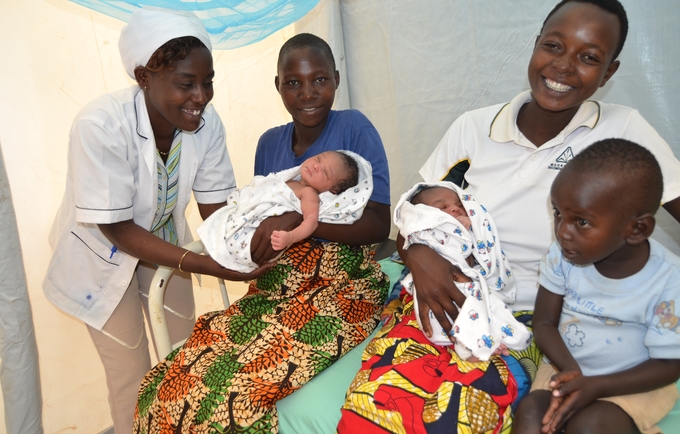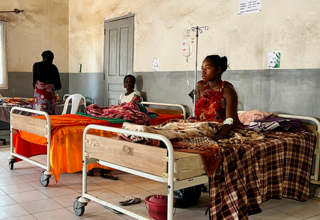Rwanda – Chantal Uwamahoro, 25, is full of joy as she cuddles her day-old baby girl in a maternity ward in Mahama Refugee Camp. With assistance from the UNFPA-supported facility, her baby was born safely even though she had walked for days, heavily pregnant and carrying a young child on her back, to escape the unrest in Burundi and reach safety in Rwanda.
In the maternity ward, Ms. Uwamahoro was in the company of three other mothers who had delivered their babies a day before her. Hers is one of several children born at the camp since it was opened in April this year.
“I am very thankful to the health workers in the camp because I delivered my baby normally, yet I had expected the worst to happen. They have been very helpful,” she said.
She describes how she fled on foot from her country to reach Gashora Reception Centre: “I walked with difficulty because I was heavily pregnant, with my first born son on my back. It took our group four days to reach the Gashora Reception Centre,” she said. Like many mothers, her husband was not with her at the time as he was in Uganda on business.
Also pleased with the maternity ward’s support is Eveline Kamurera, 24, who delivered a baby boy on 21 May. She had walked for two days to the Burundi-Rwanda border before receiving transport to Gashora Reception Centre. “I did not expect to give birth normally because I experienced complications during the long journey to the camp,” she said.
Burundian asylum seekers who are crossing the border to Rwanda to escape violence and intimidation have been arriving in Rwanda since late March. By the end of May, the number of Burundian refugees in Rwanda was more than 28,000. The refugees at Mahama Refugee Camp alone totalled 23,700.
Maternal health issues
The midwife in charge of the maternity ward, Philomene Nyirahabiyaremye, described the basics her unit had to assist deliveries and to support mothers after delivery. “Mothers come here with no baby kits. Fortunately we have dignity kits donated by UNFPA, which we give them,” she said.
At least three women give birth every day, she said. In the past two weeks four women had been referred to Kirehe District Hospital, which received referral-level life-saving equipment from UNFPA to be able to respond to emergency cases received from the refugee camp.
Antenatal care
The nurse in charge of antenatal care, Marie Vestine Nyirantagorama, said her unit attends to sixty mothers every day and expects the number to increase in future. “As the number increases we expect to get more nurses,” she said.
The role of community health workers
The in-camp health centre has eighty community health workers who sensitize the refugees about good nutrition and mobilize mothers to attend antenatal and postnatal sessions and to deliver in the facility, said Health Education Coordinator Dennis Sezibera. The American Refugee Committee (ARC) was preparing capacity-building sessions for community health workers, he said.
The role of UNFPA
UNFPA is working with ARC to provide reproductive health commodities and services. UNFPA has provided Emergency Reproductive Health Kits to both ARC and Kirehe District Hospital, as well as female and male condoms and dignity kits for mothers.
Health providers in Kirehe District Hospital and Mahama camp have been trained in the use of Emergency Reproductive Health Kits. A system of monitoring implementation of reproductive health services has also been put in place to ensure data availability and quality assurance in conformity to international standards.
In its assessment of Mahama Camp last week, UNFPA and ARC identified 454 pregnant women, 225 of whom had attended antenatal care. With the help of skilled birth attendants, 56 women had delivered. More than 6500 condoms have been distributed in the last three weeks. While condoms and emergency contraceptive pills are available in the camp, other family planning methods are yet to be offered.
By David Ssekyanzi



